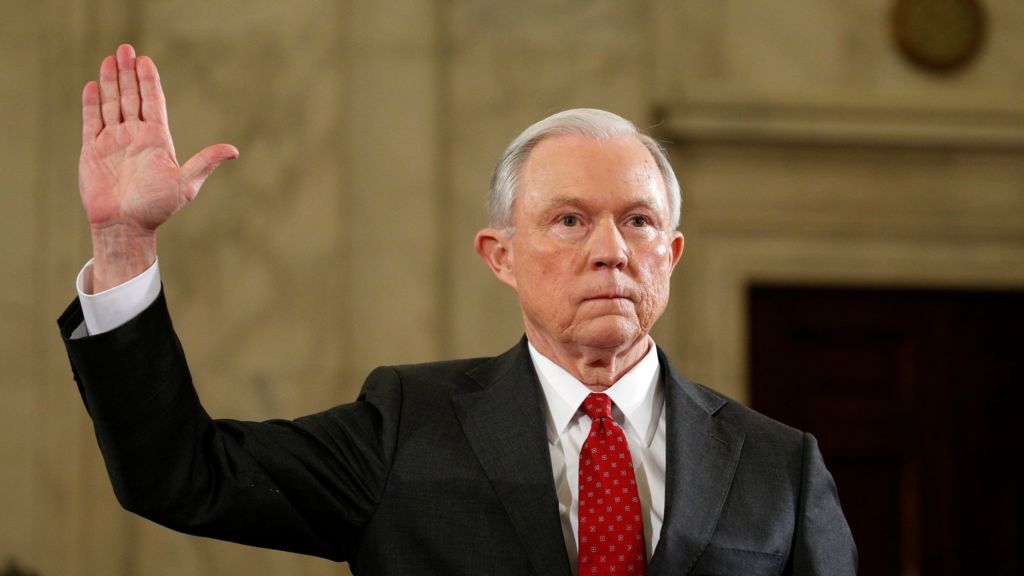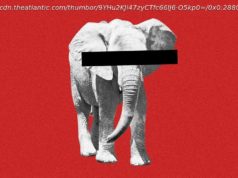 President-elect Donald Trump’s pick to be the new attorney general has denied sympathising with the Ku Klux Klan, in a tough Senate confirmation hearing.
President-elect Donald Trump’s pick to be the new attorney general has denied sympathising with the Ku Klux Klan, in a tough Senate confirmation hearing.
Alabama Senator Jeff Sessions, 69, also pledged to recuse himself from any investigation into former Democratic presidential candidate Hillary Clinton.
A Democratic senator expressed „deep concern“ about the Alabama Republican’s nomination.
But Democrats do not have the power in the chamber to block his confirmation.
The attorney general, America’s top prosecutor, leads the US justice department and acts as the main adviser to the president on legal issues.
Mr Sessions, 69, said during testimony before the Senate Judiciary Committee that allegations he had once supported the KKK were „damnably false“.
„I abhor the Klan and what it represents and its hateful ideology,“ he added.
Mr Sessions also acknowledged „the horrendous impact that relentless and systemic discrimination and the denial of voting rights has had on our African-American brothers and sisters“.
His comments came after Democratic Senator Dianne Feinstein voiced her concern over „fear in this country, particularly among the African-American community“.
She noted Senator Sessions had voted against an amendment affirming that the US would not bar people entering the US on the basis of their religion.
She also pointed out he had previously opposed efforts to ban waterboarding and expressed scepticism about the need for an anti-hate crime law.
„There’s deep fear about what a Trump administration will bring in many places,“ said Ms Feinstein.
But Republican Senator Chuck Grassley described the nominee as a „man of honour and integrity“.
When questioned about his views on gay marriage and abortion rights, Mr Sessions said he would follow the law of the land on both issues.
But he also contended that Roe v Wade, the landmark 1973 Supreme Court ruling that cleared the way for safe legal, abortions, violated the US Constitution.
In 2000 and 2009 Mr Sessions voted against legislation to expand the definition of a hate crime to include offences based on sexual orientation.
Protesters repeatedly disrupted Tuesday’s hearing.
Demonstrators dressed as members of the KKK chanted: „No Trump, No KKK, No Racist USA. “
„Stop this racist pig from getting into power,“ said an African-American demonstrator as she was led out of the hearing by police.
The Alabama politician, with 20 years under his belt in the Senate, is known as one of the most conservative members of the upper chamber.
He was denied a federal judgeship in 1986 after the Senate Judiciary Committee heard testimony that he made racist remarks.
Mr Sessions was also accused of calling a black assistant US attorney „boy“ and telling him to be careful about how he spoke to „white folks“. But he denied saying it.
He also denied on Tuesday having once called the National Association for the Advancement of Colored People (NAACP) „un-American“.
Republicans who have known him a long time and worked with him deny Mr Sessions is a racist.
Some have pointed out he supported the award of a Congressional Gold Medal to civil rights heroine Rosa Parks.
Mr Sessions opposed bipartisan efforts to give undocumented immigrants a path to citizenship, and wants to limit entry to the US, both legal and illegal.
He was one of the few Republicans to come to Mr Trump’s defence after he proposed a temporary ban on Muslims entering the US.
Senate Democratic leader Chuck Schumer said Mr Sessions had been „more anti-immigration than just about any other single member of Congress“.
They will use the two days of hearings to try to depict Mr Sessions as extreme, getting him to defend past statements and actio
They may also get him to defend some of Mr Trump’s controversial statements.
Democratic Senator Cory Booker has said he will testify against Mr Sessions, in what is thought to be an unprecedented move.
„The immense powers of the attorney general combined with the deeply troubling views of this nominee is a call to conscience,“ said the New Jersey senator.
Mr Booker pointed to the Alabama senator’s opposition to immigration reform, his criticism of the Voting Rights Act and his „failure to defend the civil rights of women, minorities, and LGBT Americans“.
Civil rights hero and congressman John Lewis may also testify.
All the president’s Cabinet appointments go to a vote in the Senate, where they can be approved by a simple majority.
Appointments cannot be confirmed until after Mr Trump’s inauguration on 20 January.






